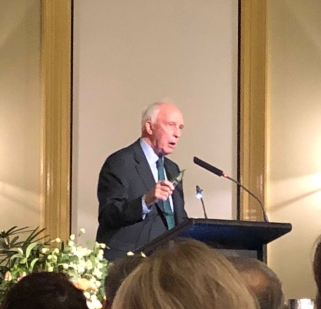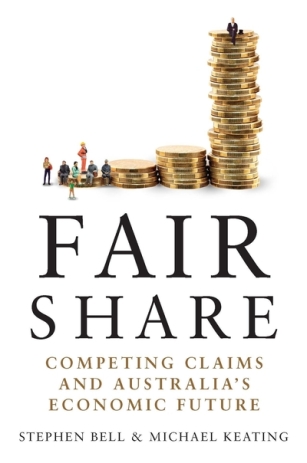Last Wednesday night I was fortunate to attend the Fair Share book launch at Brisbane’s historic Customs House. Unlike many book launches it was widely reported (e.g. this SMH article), as the book was launched by former Prime Minister Paul Keating, who described inequality as a “cancer and a curse” and argued “liberal economics is going nowhere.” His address was consistent with the main themes of Fair Share: Competing Claims and Australia’s Economic Future, written by University of Queensland Professor of Political Economy Stephen Bell and former head of the Department of Prime Minister and Cabinet, Michael Keating, no relation to our former PM. The book warns of growing inequality and social dislocation caused by disruptive technological change, including automation and artificial intelligence, and argues the solution is greater government intervention, including an activist fiscal policy and more redistribution.

Former PM Paul Keating launching Fair Share at Brisbane’s historic Customs House
The message from the authors, who also spoke at the launch, is that bigger government is necessary to prevent us from becoming the highly unequal and divided society America is today. One of the authors suggested Australia needs to position itself in the middle of the OECD in government expenditure, half way between where we sit now, similar to the US at 36-37 percent of GDP, and the Scandinavian economies at 50+ percent of GDP (see these OECD data). This would mean Australia would have government spending of 43-44 percent of GDP, meaning additional government expenditure of over $120 billion per annum, or nearly $5,000 per Australian.
Obviously, this would involve a large increase in taxation, and the burden would no doubt be disproportionately shared, with higher income earners bearing the bulk of the burden. Incentives for work and entrepreneurship would be reduced, and tax avoidance would be further encouraged. Anyone proposing greater income redistribution in Australia should reflect upon the fact that half of income tax is paid by 10 percent of taxpayers, and that nearly half of households pay zero net tax. On just how progressive our tax system already is, see this excellent fact check from my 1996 UQ economics honours classmate, ANU Associate Professor Ben Phillips:
FactCheck: is 50% of all income tax in Australia paid by 10% of the working population?
Ben is quoted in the latest Weekend Australian by Adam Creighton (Bill Shorten’s ‘left behinds’ actually got ahead) regarding some new analysis of household incomes he has undertaken:
Low-income households have enjoyed the biggest improvement in standard of living since the financial crisis, challenging Bill Shorten’s claim that inequality is rising and large parts of society are being “left behind”.
The bottom fifth of households ranked by income have had an 11 per cent rise in their living standards since 2007, more than twice as fast as those in the top income group, according to analysis undertaken at the Australian National University Centre for Social Research and Methods.
It appears we should be careful extrapolating US economic and social trends to Australia as is done in Fair Share.
I’m also sceptical about the secular stagnation thesis that the Fair Share authors advance as justification for fiscal stimulus. Australia’s unemployment rate is 5.5 percent and employment increased 3.3 percent in the 12 months to January. And, as the IMF has observed, economic growth is synchronised across the major economies internationally. Fair Share seems overly pessimistic to me.
So I mostly reject the policy recommendations of Fair Share, although I should note there is a lot of sound micro-economic and public policy analysis within the book that makes it well worth reading. Highlights for me included these comments:
- Historically, Australia has likely over-invested in road transport and irrigation infrastructure, due to “the absence of market disciplines” (pp. 136-140); and
- Australia spends enough on education and training already so “A big increase in funding is not needed; what is needed is a more equitable and cost-effective distribution of existing funding, especially for school education.” (p. 340)
Certainly we have made a mess of school funding in Australia. That said, we should move carefully as private schools save state governments a great deal of money, and we wouldn’t want to encourage a large decline in private school enrollments. On this point, see my 2016 post:
Excellent proposal for school funding reform from ISQ head David Robertson
In conclusion, Fair Share is a book worth reading, even though I disagree with its central thesis. The authors have done an excellent job in presenting the relevant economic and social data and discussing important policy issues, with the exception of immigration which is not considered, a major oversight given the intensity of the current debate. You can purchase a copy of Fair Share via Melbourne University Press’s website. Alternatively, you may be able to still find a copy at Dymocks on Albert St, Brisbane or at other good bookstores.


Great post Gene, good too see your acknowledgement that 10% of taxpayers pay 50% of income tax, for people to simply think we can keep slugging higher earners without consequences is dillusional. I still believe a full VAT without exemptions would help fund govt and services into the future but we always want to exempt different assets and transactions for a variety of reasons, mostly political. Recent debates about generational wealth distribution is a classic example, a person dies and leaves a $2milllion family home as part of their estate, the next generation inherits that home, the federal govt receives nothing and the state get some stamp duty that the purchaser has to fund.
“ Fair share” needs to be more than people’s pay packets each week, with a rapidly aging population we could well be looking at a situation where our highly qualified people will be heading elsewhere if we keep hitting income earners whilst ignoring other areas that need reform.
Absolutely. Great comments Glen. Many thanks!
Intriguing that Paul Keating should launch it. With dividend imputation, cutting the top marginal rate (rather than raising thresholds as Costello and Howard did until they made a small cut in the top rate at the end of their reign by – as I recall egged on by Emerson and Tanner) and a flat tax on what is now over two trillion dollars of savings – not to mention quickly reversing the abolition of negative gearing – he seems well ahead as the Treasurer who did the most for inequality in living memory. To be fair he did a whole bunch of good things including Brian Howe’s family package. But that’s the only really big exception that I can think of. Otherwise, the ‘long clean lines of policy’ Keating was so keen on tended to bend towards inequality.
Yes, good point. Based on his remarks, I suspect Keating is conscious of his own contribution. In his speech, he argued that the measures taken were necessary at the time to turn around the economy, but we’ve gone too far since. I recall he mentioned superannuation tax changes introduced in the 2000s, for example. Thanks for the comment Nicholas.